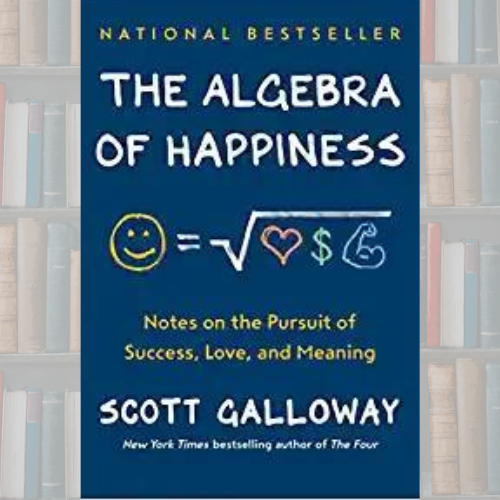By Scott Galloway

Why You Should Read This Burnout is real because we are taught to follow a specific path to achieve an ideal of success. What Scott Galloway offers it a look at what happiness can mean through the lens of a life lived without perfection, but with enjoyment for the journey. Here is the link to the Audible version of the book, but I also recommend buying a physical book that you can dog-ear and highlight and even share the humorously designed graphs with your friends who are in need of perspective from the self-described “insane professor.”
“The Algebra of Happiness” is grounded in self-awareness and reflection that comes from living through the missteps that one makes in life – and it is written by someone who at first glance – a serial entrepreneur whose experiences include an NYU business school professor, investment banker, and voice on the impact of big tech on the economy who hosts not one, but two internationally followed podcasts that focus on the intersection of finance and popular culture – is the last person you should take advice as his alter ego is “The Dawg.” While he maintains regrets, he does not ruminate on them and instead offers a path to reflect, laugh, and contemplate the meanings of our lives and the relationships with others that can define us.
This book is filled with graces and graphs across its four sections that focus on building one’s happiness from the proverbial foundation to the penthouse. The first half focuses on “the basics” and success, where the author condenses the formula for happiness into a finite number of equations that encompasses what he learned about success, ambition, career, and money from his experiences. The second half of the book is profound as it focuses on the breadth of what love and relationships mean, particularly in an over sanitized and distorted world enabled by curated social media. And most importantly, the book concludes on the long game of caring for one’s mind, body, and soul.
How You Can Apply This This book highlights that no path to a happy life can be viewed as a one-size fits all and your values combined with your long-term goals will enable you to reevaluate and innovate throughout your life. Grace for yourself and others must be shared, regardless of one’s tenure in our careers. For those starting their career, it serves the purpose of what one would tell their 25-year-old self (e.g. “getting the easy stuff right – show up early, have good manners, and follow up” never goes out of style) while for those advance in it, it is an old, treasured friend gently whispering in our ear that success is not just fleeting, it is like a game of chess that moves as we play on our journey to cultivate happiness.
Additional Materials For Reinforcing What You Learned If you want to reinforce what you gained from this book by listening to a podcast, you might enjoy: The Next Big Idea Club - BIG DATA: Cracking the Codes of Love, Happiness and Success where Seth Stephens-Davidowitz, a former Google data scientist, shares how he mined massive data sets in order to answer some of life’s most vexing questions. The answers may surprise you.
The author’s weekly blog – No Mercy/No Malice – is worth reading as it places current events in big tech, finance, and regulation into perspective and does so in a way that combines the author’s wit and ability to connect the broader dots.
You may also want to conduct a deeper dive by reading the Harvard Business Review article on the 6 Causes of Burnout, and How to Avoid Them and Steps to Take When You’re Starting to Feel Burned Out.
This book review was written by Shelley A. Svoren, VP – Leader Development for IAWA and who is the CEO + Founder of Infinite Branches. You can DM her on LinkedIn.
